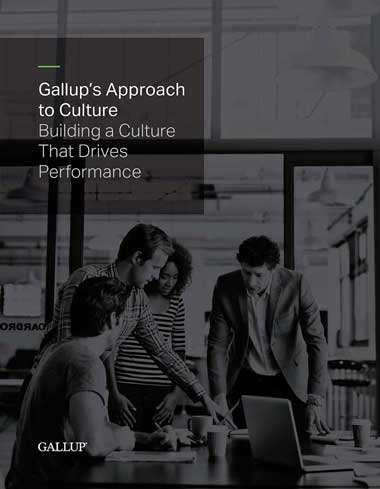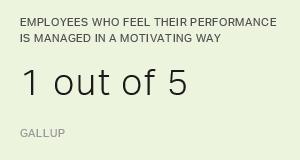Story Highlights
- Leaders can't force employees to be responsible
- Clear expectations and progress updates make it easier for people
- A positive culture will motivate employees to fulfill their commitments
Are concepts like "responsibility" and "being held accountable" viewed negatively by your employees?
Most likely, it's because leaders have tried to mandate responsibility from the top down. But that's not how responsibility works.
People are intrinsically motivated to fulfill their commitments for a range of reasons, none of which include being mandated -- at least not effectively nor sustainably.
A top-down approach makes employees feel like a kid again -- it doesn't cultivate trust and freedom -- and it doesn't motivate people to find their own way to stay on top of things.
Instead, leaders can encourage more responsibility among employees by creating an organizational culture that promotes and cascades accountability through five areas of focus.
Gallup's research and consulting experience shows that, to promote accountability, leaders and managers should:
1. Define what people are accountable for.
Employees need clearly defined expectations to achieve goals. Organizations may have evergreen responsibilities that support the organization's mission, values and purpose -- like customer centricity or quality -- that they need teams to focus on continuously.
At other times, companies may need employees to focus on accountabilities that are short term or long term, but not permanent, such as large-scale change initiatives.
But in every case, managers need to demonstrate accountability through their own availability and time spent on defining what their team is responsible for.
2. Set and cascade goals throughout the organization.
Once employees clearly understand what they're accountable for, managers should help them set measurable, individualized goals that align with their individual role. Most, if not all, employees should have metrics defined that help them know if they're delivering on the organization's goals.
Next, leaders should prioritize ongoing communication about how everyone's personal contributions and successes impact the organization's achievements.
3. Provide updates on progress.
People need information to course correct toward their goals.
Feedback can come from customer or employee surveys, ongoing project updates, key listening posts with critical stakeholders, or some combination of these. The most effective form of feedback, however, comes from frequent conversations between managers and employees.
When preparing to provide a progress update, managers should not ask themselves if they have all the data, but instead if they have the right data. Data that are performance orientated so they can speak to the behavior that has allowed the progress.
4. Align development, learning and growth.
Whether through conversations between managers and employees, or as part of an ongoing developmental path, organizations must provide opportunities for employees to improve, learn and grow.
Gallup analytics show that millennials rank the opportunity to learn and grow in a job No. 1 -- above all other job considerations -- and it's high on the ranks for other generations as well.
Managers who focus on employee development help workers address the roadblocks that prevent their ability to deliver on goals while learning and growing in the role.
5. Recognize and celebrate progress.
Praise for good work is the most motivating of all forms of feedback.
Identify, celebrate and learn from successes. It motivates employees to stretch and creates responsibility role models for others to follow.
What Promoting Accountability Looks Like in Practice
When leaders clearly define and communicate what the organization and employees are accountable for and committed to achieving, they are describing an ideal culture.
But as It's the Manager reports, "a major challenge for leaders of large organizations is that there is no common culture." Moreover, only about half of all workers -- and fewer managers -- even know what's expected of them.
Leaders who define accountability align individuals and teams toward a common outcome, commonly referred to as objectives or goals. Goals inform workers of what's expected of them and help workers determine how to accomplish them.
And giving people a say in goal setting can galvanize their commitment to achieving them. Altogether, these actions can solve a lack of accountability when lack of clarity is the problem, which, Gallup's research shows, is not uncommon.
A to-do list is not enough, however. All employees, from the C-suite down need follow up and feedback.
"Everyone should play a role in developing their colleagues by providing meaningful feedback and coaching," says It's the Manager. "Leaders need to be the first to model these demands because their behavior dictates what employees interpret as a real expectation."
Setting expectations that all employees will commit to achieving is a leader's job. So is frequently communicating and reinforcing the importance of the goal to the organization's success and that all roles make a crucial contribution to accomplishing it.
However, while clarity and consistency of definition are critical, so is concision. When leaders deliver too many messages, as inspiring as they may be, employees can get confused -- even overwhelmed -- by myriad expectations that all seem to be the "most important."
To keep definitions and expectations sharply focused -- and to improve performance as well -- Gallup recommends encouraging managers to have frequent coaching conversations with their direct reports; performance is best directed in the moment.
But 47% of workers received feedback from their manager "a few times or less" in the past year, and only 26% of employees strongly agree that the feedback they receive helps them do their work better. A company's accountability problem may actually be a coaching problem in disguise.
A company's accountability problem may actually be a coaching problem in disguise.
These conversations should address successes, challenges, ideas for improvement and ways to integrate ongoing learning and development.
Companies will find that frequent, performance-focused coaching conversations make it easier to recognize development and growth opportunities for employees. Managers who stay in close contact with workers know where their gaps are and where their potential lies.
They also activate responsibility -- employees who feel cared for by their managers are more likely to want to come through.
People who feel neglected aren't so motivated. And criticism and threats only demotivate workers and discourage accountability -- when failure to live up to a commitment is punished, people just hide their mistakes.
Employees who feel cared for by their managers are more likely to want to come through. People who feel neglected aren't so motivated.
About a quarter of all employees say the most memorable recognition they ever received was from a high-level leader or CEO, which makes praise for good work a uniquely powerful leadership tool.
And it's underutilized. Gallup finds that only about one in three workers in the U.S. strongly agree that they received recognition or praise for doing good work in the past seven days.
Make Responsibility Easier -- And More Rewarding
When promoting accountability, this provides structures and processes people need to do what they say they'll do. It makes it easier to be responsible.
It not only makes it easier, it makes people want to go the extra mile because they can clearly see their personal progress, they're regularly receiving individualized coaching and praise, and they're not being forced to merely comply.
Again, leaders can't force people to develop a meaningful sense of accountability.
They can create conditions that foster personal commitment -- by shaping an organizational culture that promotes responsibility.
Gallup can help you create accountability in your workplace:
- Download our culture perspective paper to learn how to get the most out of your culture.
- Sign your managers up for The 5 Conversations That Drive Performance course.
- Put best-practice management insights and action planning tools directly into the hands of your managers with Gallup Access.


